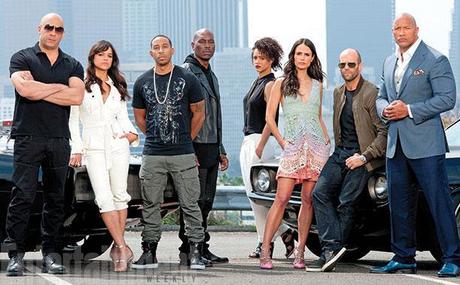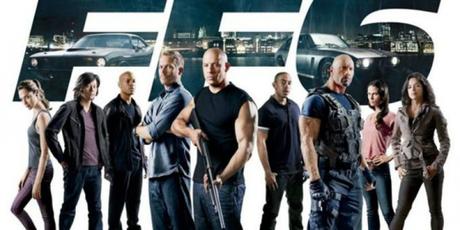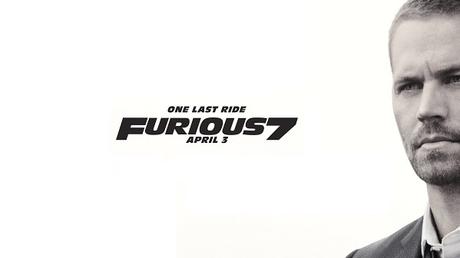Not nearly enough movies feature significant roles for women, but Hollywood is not sexist. Not nearly enough movies feature actors of color in leading roles, but Hollywood is not racist. Sure, just like anywhere else there probably really are some hardcore sexists and racists in the bunch as well as graying executives struggling to adapt to the times. Also just like anywhere else, racism and sexism has likely become institutionalized. However, Hollywood, in general, is not in the business of discrimination (behind the scenes is another story); Hollywood is in the business of making money. It’s just taking Hollywood way too damn long to realize that giving a mere 30% of speaking roles to women and only 17% of all leading roles to nonwhite actors is bad for business. Why? Because women buy more U.S. movie tickets than men, albeit just barely, and minorities account for 46% of all U.S. movie ticket purchases.
As a result, every time a female-led hit like Maleficent, Fault in Our Stars, Fifty Shades of Grey, or Cinderella comes along and prospers largely because of women it will be treated by some as another excuse to essentially blurt out, “I told you so!”
The same is now true for whenever a new Fast & Furious installment comes out, sadly standing in as the only poster child we have for a film franchise whose ethnically diverse cast actually mirrors the melting pot that is America. Entertainment Weekly summed it up perfectly by opening a recent Furious 7 story with a two-page picture of the film’s cast accompanied by the headline “This Is What America Looks Like. So, Why Don’t Our Movies?”

Found on EW.com
For the record, Vin Diesel is a person of somewhat ambiguous color, Michelle Rodriguez is of Dominican and Peurto Rican descent, Ludacris and Tyrese are African-Americans, franchise newcomer Nathalie Emmanuel grew up in England with a Dominican mother and half-English father, Jordan Brewster has a Brazilian mother and American father, Jason Statham is British, and Dwayne “The Rock” Johnson is African-American-Samoan, jokingly referred to as “Samoan Thor” by Diesel’s character in the films. They have all of that, yet it was a sign of progress exactly one year ago when Captain America: The Winter Soldier gave Steve Rogers a black friend, upping the Marvel Cinematic Universe’s notable characters of color to four (Anthony Mackie’s Falcon, Idris Elba’s Heimdell, Samuel L. Jackson’s Nick Fury, Don Cheadle’s War Machine, two of whom are historically depicted as white in the comics). That solo movie for Chadwick Boseman’s Black Panther is still 3 years away at this point, and all signs indicate Marvel will stick with the Peter Parker Spider-Man for their 2017 reboot even though the comics have provided a Black Hispanic alternative.

Just for the record, I love Anthony Mackie in The Winter Soldier, and hope he’s a big part of Captain America 3
Now, Furious 7 has crushed Winter Soldier’s record for biggest opening weekend ($95m) for the month of April. In fact, Furious 7 came in even slightly higher than everyone had originally estimated on Sunday, at which point the exact figures were believed to be $143.6 million domestic and $240.4 million international. Boosted by stronger-than-expected Easter Sunday business, Furious 7’s actual totals are $147.2m domestic and $245m international for a worldwide debut of $392.3m, finishing just barely behind The Avengers ($392.5m) on the list of all-time global openings. The only other two movies ahead of Furious 7 on that list are a couple of Harry Potter sequels, Deathly Hallows 2 ($483.2m) and Half-Blood Prince ($394.4m). Of course, the only types of films that are going to show up on a list like that are the ones which opened pretty much everywhere in the world at the same time. Obviously, Furious 7 qualifies, playing in just over 4,000 domestic theaters and on more than 10,500 screens overseas, easily the widest release in Universal history. The only major market not to get it was China, and that’s going to change in just a couple of days.
On the strictly domestic side of things, Furious 7 placed 9th on the list of biggest openings weekends, trailing Spider-Man 3, Hunger Games, Hunger Games: Catching Fire, The Dark Knight, Dark Knight Rises, Deathly Hallows 2, Iron Man 3, and The Avengers. It’s worth noting that unlike some of those films Furious 7 did all of this without the benefit of 3D ticket pricing.

Fast & Furious 6 ultimately grossed $238m domestic, $788m worldwide. Not only will Furious 7 best both of those it could end up with over $1 billion worldwide.
This is the type of opening weekend that is far too big to ignore, and just like Fast & Furious 6 it’s largely thanks to minorities. According to Universal Pictures, exactly three-quarters of the Americans who saw Furious 6 were non-white, specifically Latino (33%), African-American (29%), and of Asian descent (13%). Furious 7 mirrored that breakdown this weekend, with three-quarters of the audience again being non-white, led by Latinos (37%) followed by African-Americans (24%) and Asians (10%) and the somewhat nebulous “other” category (4%).
So, does all of this mean that if Warner Bros. suddenly gave us a multi-ethnic Justice League movie, switching races for some of the key members, that they would automatically receive overwhelming support from minorities? Probably not because such a move would risk alienating the core audience, but also because it’s not quite as simple as “If you offer non-white characters the minorities will come.” It takes a multi-pronged marketing effort to get the word out, and from that point of view part of the beauty of Furious 7’s diverse cast was that it could be deployed by Universal so strategically. As profiled by EW, Vin Diesel appeared on stage in front of 20,000 people at a concert for brachata singer Romeo Santas to announce that Santos would be in Furious 7, Michelle Rodriguez was heavily featured in ads run during Univision’s highest-rated awards show honoring Latin music, Latin pop star Prince Royce released his song from the Furious 7 soundtrack to his 32 million Facebook fans and 3.9 million Twitter followers, Jordana Brewster did a full-day of targeted Latino press, and Ludacris and Tyrese appeared on Sean Combs’ new network to celebrate the Furious 7 soundtrack and promote the movie.
Plus, for as much as some might want to turn Furious 7’s business into a “I told you so!” moment regarding Hollywood’s need for more diversity such a tactic ignores the likely unquantifiable boost the film received from the “restrained but effective” way it handled promoting this as Paul Walker’s last film. Their challenge was to acknowledge the reality of the situation – Walker died due to an off-set car crash during a break from filming, forcing Furious 7 to use the late actor’s brothers as well as CGI to complete his portion of the film – without seeming disrespectful. In fact, when the first Furious 7 teaser emerged highlighting a scene in which Walker’s character barely escapes certain death it made for rather awkward viewing.

But all of that is much messier to figure out in terms of box office impact. So, the focus remains more on how lily-white Hollywood needs to wake up to the lessons being served up by Furious 7’s success, especially in the same year the Academy Awards inspired the Twitter hashtag #OscarsSoWhite. Universal’s production co-president JeffreyKirschenbaum is already on board, telling EW, “Diverse stories with diverse characters need to be told. Not out of any sense of altruism, but because your audience is looking for stories they can connect to and access. If they can’t connect and access, they’re not coming. All of us have to take heed of that. We’re starting to recalibrate how we’re looking at not only movies and how to cast them, but who our heroes are.”
But it’s not just the guy responsible for Fast & Furious franchise saying that. Smart university-types think so too. UCLA’s Darnell Hunt, of the Ralph J. Bunche Center for African American Studies, analyzed the top 100 grossing films of 2012 and 2013, and found that those with casts about 30 percent diverse did best at the worldwide box office. That’s an important conclusion because one of the primary defenses for Hollywood’s aversion to color is an entrenched view that films featuring actors of color do not sell tickets oversees, which now accounts for 70% of a blockbuster’s box office. Just look at the domestic/international breakdown for the average Kevin Hart movie to see the truth in that viewpoint. However, UCLA calls bullshit on that, and now Furious 7 has ascended to the elite ranks of film franchises. Is Fast & Furious really just the odd outlier? Is the make-up of its cast perhaps overblown, its appeal more attributable to the way it features awesome cars and chase scenes, playing straight into crucial components of Latino and Asian culture? Is it just one of the only action franchise going at the moment that has improbably survived and thrived in the age of the comic book and toys-turned-film-franchises, prioritizing the practical over the digital for its stunts and making it seem all the more unique as a result?

The stunts in these movies are so insane and eye-popping that they transcend language barriers
Yes to all those things? It’s silly to attribute everything about Fast & Furious to its diversity, but it’s idiotic to dismiss it. For her part, Michelle Rodriguez thinks Hollywood is generally abdicating a responsibility to tell stories for all audiences, “Hollywood has become the standardized voice of our planet. But it does not represent the majority of people. And a lot of people here forget how many people around the world are brown or yellow or black.” Fast & Furious franchise producer Neal H. Moritz suggests that changes are on the way, just not as quickly as some would like, “A lot of the time, Hollywood is slow to change. It’s like one of those huge ocean liners that really take a long time to turn around.”
Even when it does move uncharacteristically fast it still has plenty of ground to make up. Case in point, remember how I said that only 17% of leading roles go to minorities? Well, that’s as of 2013, and it represents a 59% improvement over 2011 and 2012 when the percentage of nonwhite actors cast in leading film roles was just 10.5% and 15.1% respectively. That’s not exactly the sea change that would lead Deadline to declare, “Won’t someone please think of all those poor white actors struggling for roles!” as it recently did in response to the diverse casting underway on the TV side of things due to the success of Blackish, Fresh Off the Boat, and Empire. However, it is progress. It’s unrealistic and unnecessary to start populating all major movies with diverse casts on the level of Fast & Furious, but doing more of them wouldn’t be a bad idea. Plus, maybe more of our white heroes are going to start getting black friends, like Naomi Harris’ re-conceived version of Eve Moneypenny in Skyfall, and maybe even Asian ones, like Wolverine’s sword-wielding, butt-kicking sidekick in The Wolverine.
This Weekend’s Actual Box Office Top 10 Totals (4/3-4/5)
1. Furious 7 (Worldwide Opening)
- Production Budget=$190m
- Weekend Gross (Domestic)=$147.1m
- Weekend Gross (International)=$245.1m
- Worldwide Debut=$329.3m
2. Home
- Production Budget=$135m
- Weekend Gross (Domestic)=$27m
- Weekend Gross (International)=$20.7m
- Domestic/International/Worldwide=$95.2m/$85.2m/$180.4m
3. Get Hard
- Production Budget=$40m
- Weekend Gross (Domestic)=$13.1m
- Weekend Gross (International)=$2.6m
- Domestic/International/Worldwide=$57.2m/$10.3m/$67.5m
4. Cinderella
- Production Budget=$95m
- Weekend Gross (Domestic)=$10.1m
- Weekend Gross (International)=$24.3m
- Domestic/International/Worldwide=$167.1m/$230m/$397.1m
5. Insurgent
- Production Budget=$110m
- Weekend Gross (Domestic)=$10.1m
- Weekend Gross (International)=$15.5m
- Domestic/International/Worldwide=$103.5m/$120.2m/$223.7m
6. It Follows
- Production Budget=$2m
- Weekend Gross (Domestic)=$2.5m
- Weekend Gross (International)=Nothing
- Domestic Total=$8.5m
7. Woman in Gold (Debut)
- Production Budget=$2m
- Weekend Gross (Domestic)=$2.1m
- Weekend Gross (International)=Nothing
- Domestic Debut=$2.1m
8. Kingsman: The Secret Service
- Production Budget=$81m
- Weekend Gross (Domestic)=$1.8m
- Weekend Gross (International)=$20m
- Current Domestic/International/Worldwide Total=$122.3m/$248.3m/$370.6m
9. Do You Believe?
- Production Budget=They’re Not Telling
- Weekend Gross (Domestic)=$1.5m
- Weekend Gross (International)=Nothing
- Domestic Total=$9.8m
10. The Second Best Exotic Marigold Hotel
- Production Budget=$10m
- Weekend Gross (Domestic)=$1m
- Weekend Gross (International)=$3m
- Current Domestic/International/Worldwide Total=$30.1m/$43.3m/$73.4m
What Left the Top 10?: Run All Night (Current total: $44.9m worldwide/$50m budget) & The Gunman (Current total: $10m worldwide/$40m budget)
What’s Up Next?: A new Nicholas Sparks movie, The Longest Ride, again depicting pretty white people falling in love except this time at least one of them is a cowboy.
Sources: BoxOfficeMojo.com, EW.com

